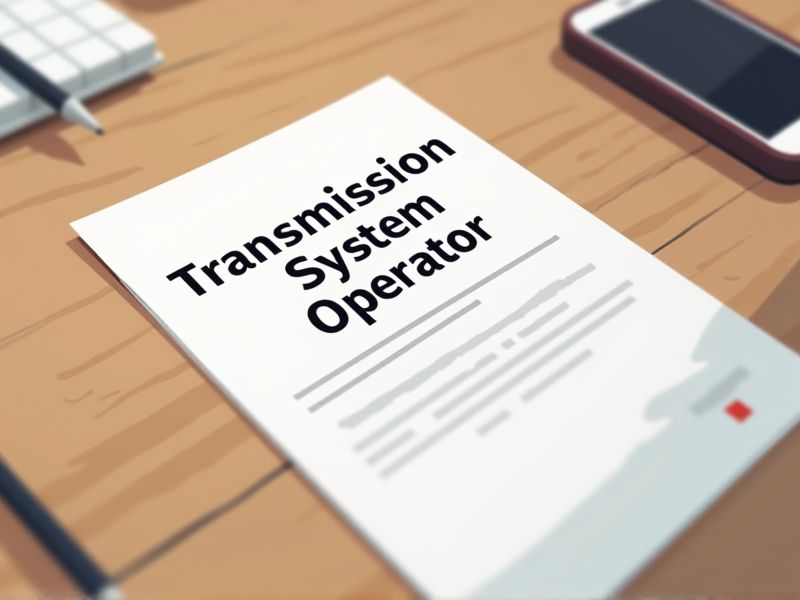
Transmission System Operators (TSOs) manage the critical infrastructure that ensures reliable electricity or natural gas flow, making regulatory compliance paramount. Certifications validate the technical proficiency TSOs require to handle complex equipment and adhere to industry standards. They also enhance operational safety and efficiency, reducing the risk of system failures and the associated costs. Here are some important certifications essential for a Transmission System Operator's role.
NERC System Operator Certification
NERC System Operator Certification ensures that transmission system operators possess the necessary knowledge and skills to maintain reliability and stability in the power grid. Certification validates that operators understand essential standards and best practices critical for grid management. It reduces the risk of human error that can lead to major blackouts or disruptions, protecting the integrity of the electricity supply. Regulators and stakeholders have increased confidence in the system's reliability when operators are certified, which can lead to enhanced trust and cooperation in energy markets.
NERC Reliability Coordinator Certification
The NERC Reliability Coordinator Certification is crucial because it ensures that Transmission System Operators adhere to standardized protocols for grid stability. This certification equips operators with the knowledge to prevent outages and manage high-demand scenarios effectively. Certification establishes credibility and trust, reinforcing the operator's competence in maintaining grid reliability. Compliance with NERC standards is mandated, aligning operators' practices with national energy reliability goals.
SCADA/EMS Operator Certification
SCADA/EMS Operator Certification ensures that Transmission System Operators possess critical skills for managing and overseeing complex transmission networks. Certification standardizes knowledge and practices across operators, reducing errors and enhancing system reliability. A certified operator can effectively respond to system disturbances, minimizing potential outages and their impact. Certification programs also promote continuous education amidst evolving technology, ensuring operators remain updated on best practices.
Electric Power Transmission & Distribution Certification
Electric Power Transmission & Distribution Certification provides standardized training, which enhances the skills and competencies of Transmission System Operators, ensuring they can efficiently manage grid stability. The certification helps operators understand and implement the latest technological advancements and regulatory requirements, reducing the risk of operational non-compliance. Certified expertise is crucial for minimizing transmission losses and improving overall system efficiency, which directly impacts energy costs and reliability. In a rapidly evolving energy sector, such certification ensures that operators are prepared to handle challenges related to renewable integration and grid modernization.
OSHA Electrical Safety Certification
Obtaining OSHA Electrical Safety Certification for a Transmission System Operator ensures adherence to standardized safety protocols, reducing the risk of electrical fatalities. The certification educates operators about proper handling and maintenance procedures, minimizing system downtime. Compliance with OSHA regulations demonstrates the operator's commitment to workplace safety, thereby enhancing the company's reputation. Preventable workplace incidents decrease, resulting in lower insurance costs and increased efficiency.
IEEE Power Systems Certification
The IEEE Power Systems Certification ensures that a Transmission System Operator (TSO) possesses the necessary technical expertise to maintain and optimize complex electrical grids. The certification enhances credibility among stakeholders, fostering trust in the operator's ability to manage power systems reliably. The evolving landscape of renewable energy integration necessitates specialized knowledge, which the certification provides, to effectively handle grid challenges. Regulatory bodies often require certifications like IEEE to standardize the skills and knowledge for effective system operation and safety compliance.
Certified Energy Manager (CEM)
Transmission System Operators (TSOs) oversee the efficient and reliable operation of electricity grids, and having a Certified Energy Manager (CEM) ensures that energy efficiency measures are optimized. A CEM contributes specialized knowledge in energy audits and sustainability practices, reducing operational costs and environmental impact. Furthermore, with increasing renewable integration, a CEM aids in managing variable energy resources effectively. Their expertise enhances decision-making for infrastructure investments and grid management, ensuring compliance with regulations and market demands.
IT/OT Cybersecurity Certification for Critical Infrastructure
The integration of IT and OT in transmission systems creates an expanded attack surface, leading to increased vulnerability to cyber threats. Proper certification ensures that professionals have the necessary skills to protect these systems, minimizing risks to grid stability. A certified workforce contributes to regulatory compliance, helping operators meet legal and industry standards. Certification also fosters a culture of continuous improvement, advancing overall cybersecurity resilience in critical infrastructure.
Project Management Professional (PMP) Certification
Achieving PMP Certification equips Transmission System Operators with robust project management skills essential for overseeing complex grid upgrades and maintenance initiatives. Improved ability to manage resources and timelines leads to more efficient energy delivery and stability across the transmission network. Expertise in risk management aids operators in preemptively addressing potential disruptions and minimizing downtime. A recognized standard like PMP Certification enhances credibility and opportunities for career advancement within the energy sector.
Energy Risk Professional (ERP) Certification
The ERP Certification provides a comprehensive understanding of energy markets, which is crucial for Transmission System Operators to manage grid stability and efficiency. Heightened knowledge of risk management strategies enables these operators to mitigate potential disruptions in energy supply. Certification ensures alignment with industry standards, fostering greater trust and collaboration with stakeholders. As energy systems evolve with renewable integration, ERP-certified operators are better equipped to adapt and ensure smooth transitions.
Summary
When you notice a Transmission System Operator gaining certifications, you can expect enhanced operational efficiency. Certifications typically lead to improved system reliability due to adherence to industry standards and practices. This often results in reduced downtime, minimizing disruptions in power supply and ensuring a stable electricity flow. Furthermore, a certified operator boosts stakeholder confidence, potentially attracting investment and partnerships.
